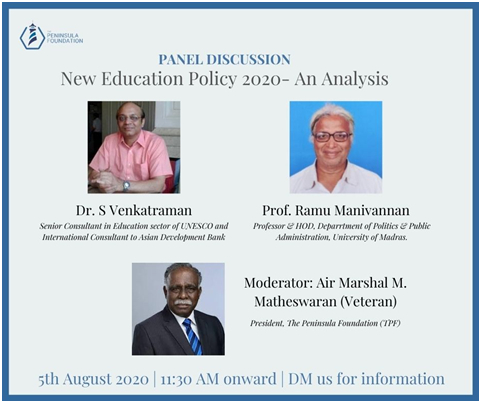New Education Policy 2020- An Analysis

August 05 2020 | The Peninsula Foundation (TPF), organized a virtual panel discussion on The New Indian Education Policy Proposal 2020 on Wednesday 5th of August. This panel was moderated by Air Marshal M. Matheswaran and included guest speakers Prof. Ramu Manivannan HOD of Politics and Public Administration, at the University of Madras, and Dr. S Venkatraman a Senior Consultant in the Education sector of UNESCO.
Mr. Manivannan mentioned that one major flaw is that this proposal was neither discussed nor debated in parliament, even though many points need to be debated on, such as the 5+3+3+4 structure. Additionally, he pointed out the technical issues in the drafting of this proposal, such as the lack of clarity on the role of the state in the education sector, since the proposal seems to be rather centralised. MrManivannan urged us to understand that the claim of “6% of GDP will be spent on education” is only a projection and not reality. Usually, before the government projects spending, they ensure they can sustain this spending over at least 5 years, as done in the case of defence. However, keeping in mind the situation of a Global Pandemic India is fighting, this number seems to be more of a projection rather than reality.
Dr. Venkatraman started by mentioning that the new draft needs to specify what was wrong with the previous education policy and why a change was needed in the first place. He then pointed out the fact that the introduction did mention the Sustainable Development Goals(SDGs), however, does not continue talking about the SDGs in order parts of the draft. It was also brought to our attention that the draft policy completely left out any relevant details on health and nutrition, especially since the new policy states that kids from age 3 need to start attending school. The proposal only mentions “breakfast and midday meal”, however, does not seem to emphasize malnutrition and the micronutrients that will be provided to these young students. Dr. Venkatraman also questioned why the proposal does not mention the International Student Assessments, as India is one of the only developing countries in the world who do not participate in this competition. This assessment is a good indicator to understand where our students stand internationally and the potential skill levels of the youth. Additionally, the NEP does not mention anything about teacher qualification at a higher level, which can confuse schools while hiring teachers. Adult education has been given very low importance, even though adult education regarding women’s rights, LGBTQ rights and child rights is essential for a progressive mindset. Most importantly, this NEP does not discuss anything on monitoring, which is one of the most important details about any document. It fails to explain how the government will ensure all of these elaborate rules will take place in the country. Dr. Venkatraman concluded by mentioning the strengths of this NEP, for example, the fact that they are bringing on multidisciplinary methods of education, nonetheless the NEP needs to work on being more specific and detailed for it to successfully work in India.
Air Marshal Matheswaran ended the discussion by pointing out that the policy does not include anything about the logical, cognitive and activity-based learning which is essential for education reform in India. Even though the document did note the dangers of rote based and memory learning, it fails to explain what the replacement will be. During the discussion, one intern pointed out that there is no mention of sex education. According to a survey by the World Bank, sex education is the primary method to end sexual violence in any country. India being highly ranked for sexual violence, should make sure sex education is given both to males and females by middle school.
The discussion concluded with the panelists agreeing to the fact that the New Education Policy is a step in the right direction, however, needs some amendments and needs to be more specific and detailed as a whole.
